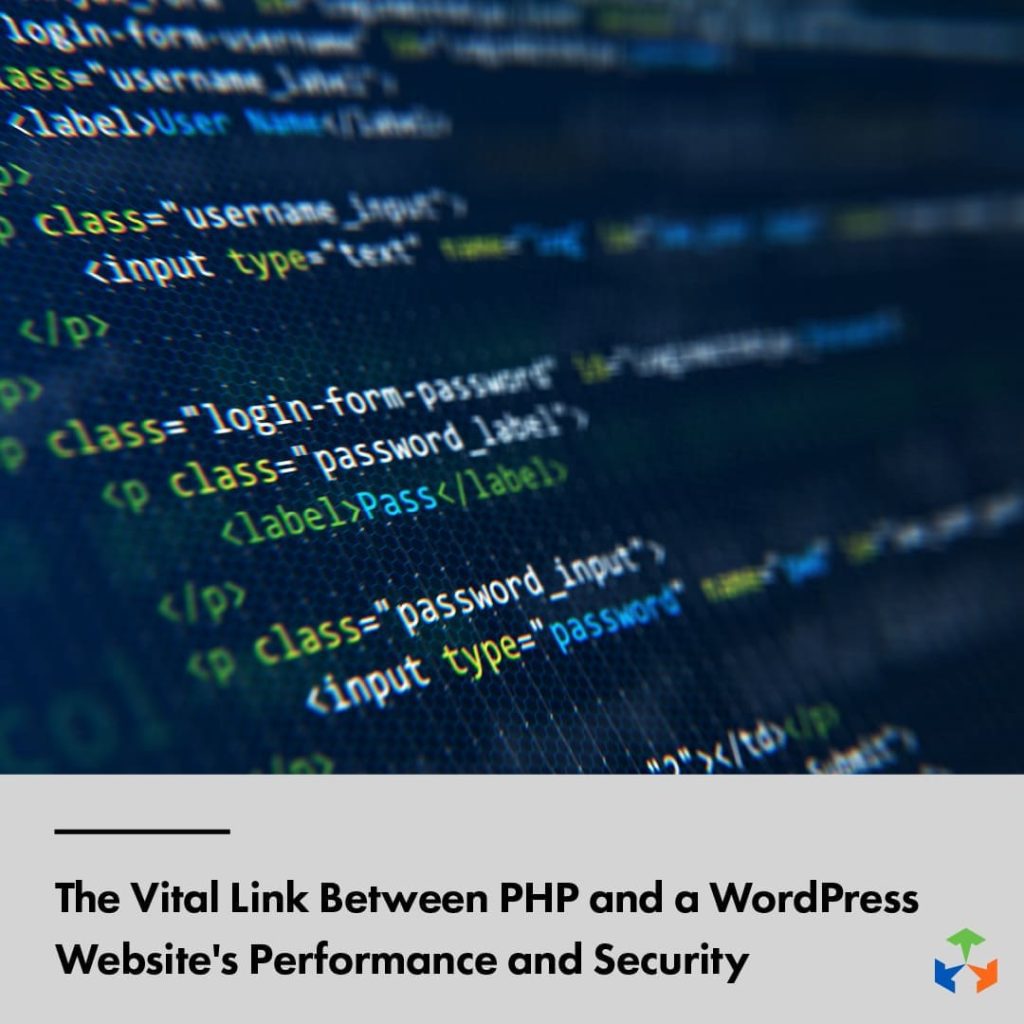PHP and a WordPress Performance and Security

The Vital Link Between PHP and a WordPress Website’s Performance and Security
Hypertext Preprocessor, also known as PHP, stands tall as a foundational server-side scripting language dedicated to web development. Imbedded within HTML code and executed on a server, PHP acts as the engine propelling websites into existence. Its influence extends far and wide, powering over 80% of websites on the internet and forming the bedrock of interactive and engaging online experiences.
Imagine PHP as an engine within a car, while a WordPress website serves as the vehicle itself. Just as an engine is the driving force for a car, PHP empowers and navigates the functionalities of a WordPress website. This analogy shows the importance an engine has as the dynamic force behind a vehicle, responsible for its performance, speed and reliability. In a similar vein, PHP acts as the dynamic force behind WordPress, enabling its functionality, content generation and interaction with databases. Simply having an engine isn’t enough; it must also be well-maintained and up to date for a smooth and efficient ride. Similarly, websites need to have updated, non-deprecated versions of PHP to ensures a secure, optimized and seamless experience for a WordPress website. Neglecting PHP updates would be comparable to continuing to drive with an outdated engine in a car. Using outdated or old PHP can lead to potential performance issues, security vulnerabilities and compatibility concerns for a website.
Understanding PHP’s Significance:
PHP was born from Rasmus Lerdorf’s creation in 1994 and has evolved into a versatile and robust programming language. Its flexibility empowers developers to execute various tasks, including:
- Server-Side Scripting: PHP dynamically generates HTML output on a server, enabling interactive content based on user interactions or database queries.
- Interacting with Databases: Seamless connectivity with diverse databases allows for efficient storage and retrieval of information, pivotal for numerous web applications.
- Web Application Development: PHP facilitates the creation of intricate web applications, including content management systems (CMS) like WordPress, e-commerce platforms, forums and more.
Why PHP Matters for WordPress:
WordPress is globally recognized as the leading CMS. The platform powers approximately 40% of websites worldwide and relies heavily on PHP. Built upon PHP and using a MySQL database, WordPress depends on PHP to execute core functionalities, themes, plugins and other integral components.
Using up-to-date, non-deprecated versions of PHP is imperative for WordPress websites because of:
- Security: Deprecated PHP versions lack security updates, leaving websites vulnerable to potential threats and attacks. Outdated PHP versions pose significant security risks that could potentially lead to data breaches or hacking.
- Performance: Newer PHP versions bring performance improvements, optimizations and enhanced features, resulting in faster loading speeds and an improved overall website performance.
- Compatibility: Using the latest PHP version ensures compatibility with the latest WordPress core, themes, plugins and third-party tools. Deprecated PHP versions may limit compatibility with updates and optimizations for developers.
- Support and Bug Fixes: Deprecated PHP versions no longer receive support or bug fixes thus, missing critical updates that enhance stability and resolve issues in the WordPress platform.
In conclusion, PHP forms the backbone of web development, particularly for WordPress websites. Using deprecated PHP versions poses substantial risks to the security, performance and compatibility of a WordPress website. Therefore, ensuring regular updates and using supported versions of PHP are crucial for optimal functionality, security and alignment with the latest WordPress features.
By staying vigilant and maintaining an up-to-date PHP website, WordPress website owners can safeguard their websites, ensuring a safer, faster and more reliable online experience for themselves and visitors. Regular updates and adherence to recommended PHP versions will fortify a WordPress website, providing a resilient foundation for growth and engagement in the online sphere.
If your website needs a refresh or you’re not sure how to keep up with the latest PHP changes, contact Impact Marketing at (319) 232-4332, today. We would be happy to assist with any of your website needs.









